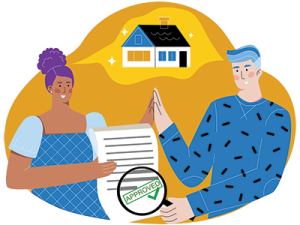Mortgage Jargon Explained: Our Glossary
Buying a home means learning a lot of new terminology, and it can get overwhelming. This glossary explains the most common mortgage terms in plain English, helping you understand your options and feel confident during your home purchase.
Mortgage Types and Interest Rates
Bank of England Base Rate
This is the interest rate set by the Bank of England. It is a powerful tool used to control the economy. It directly influences the interest rates that commercial lenders charge on mortgages, especially for those on a tracker or standard variable rate.
Fixed Rate Mortgage
A mortgage where the interest rate is locked in for a set time, usually for 2, 5, or 10 years. This means your monthly repayments will not change during this period.
Interest Only
With an interest-only mortgage, your monthly payments cover only the interest charged on the loan.
The original capital amount you borrowed is not reduced and must be repaid in full at the end of the mortgage term, usually through a separate savings or investment plan.
Interest Rate
The interest rate is the percentage a lender charges you for borrowing the money. It is added to your loan amount and forms part of your monthly repayment.
Repayment Mortgage
This is the most common type of mortgage. Each of your monthly repayments is split into two parts: a portion goes towards paying off the interest, and the rest goes towards paying off the capital (the original loan amount).
As you get closer to the end of your mortgage term, a larger portion of your payment will go towards the capital.
Standard Variable Rate (SVR)
This is a lender’s default interest rate. You will typically be moved onto this rate once your initial fixed or tracker deal ends.
The rate can go up or down at any time, and it is usually much higher than your initial rate, making it more expensive.
Tracker Rate Mortgage
A mortgage with an interest rate that is set at a fixed percentage above the Bank of England (BoE) base rate.
For example, if the BoE rate is 4% and your mortgage is a tracker rate of BoE + 1%, your interest rate will be 5%. Your monthly payments will rise or fall automatically in line with any changes to the BoE base rate.
- Fixed, competitive legal fees with no hidden costs.
- Expert conveyancing solicitors with proven local knowledge.
- No Sale, No Fee protection for your transaction. Terms apply.
- On 99% of mortgage lender panels.
- Fast completions.
- We can solve any property challenge.
Costs, Fees, and Charges
Annual Percentage Rate (APR)
The Annual Percentage Rate is a key figure you'll see on mortgage offers. It includes not just the interest rate, but also all the mandatory fees you'll have to pay.
Arrangement Fee
This is a fee charged by the lender to cover the administration involved in setting up your mortgage.
The fee can be paid upfront when you apply, or it can be added to your mortgage loan, but remember that you'll pay interest on it if you choose the latter.
Booking Fee
A non-refundable fee charged on some mortgages to secure a specific deal, such as a low-interest fixed rate. It's often paid at the time you submit your mortgage application.
Completion Fee
A fee to cover the final transfer of the mortgage funds to your solicitor on completion day. This is a one-off payment that wraps up the mortgage process.
Early Repayment Charges (ERC)
An ERC is a fee you may have to pay if you repay all or part of your mortgage before the end of a specific period (e.g., your 5-year fixed-rate term).
This often applies if you move to a new lender or a new deal during that time and can be a significant cost, sometimes as high as 5% of the loan amount.
Exit Fee
Also known as a closure or deeds release fee, this is a final administration fee charged by the lender when you have completely paid off your mortgage and closed the account.
Service Fee
This is an administrative fee charged by a lender for specific services, such as providing a mortgage statement or a reference to another lender.

- Every stage is explained in your language. No nonsense.
- We hold your hand from start to finish.
- Fixed Fee Conveyancing quotes.
- No Sale No Fee protections (except Auction and Right to Buy).
- Fast completions for new builds.
Financial Terms
Arrears
This is a legal term for missed mortgage payments. If you fall into arrears, it means you owe the lender money because you have not met your monthly repayment obligations.
This can negatively impact your credit report and may result in the lender taking legal action.
Credit Report
A detailed record of your borrowing history, including credit cards, loans, and past mortgages. Lenders check your credit report to see how you have managed debt in the past.
Having a good credit history is essential for getting approved for a mortgage and for accessing the best rates.
Deposit
The portion of the property's purchase price that you pay upfront using your own money. The size of your deposit is a major factor in how much a lender will loan you.
A larger deposit means you need to borrow less and may qualify for a lower interest rate.
Equity
The part of your property that you truly own. It is the difference between the market value of your home and the amount you still owe on your mortgage.
For example, if your home is valued at £200,000 and you owe £150,000 on your mortgage, you have £50,000 in equity.
Loan to Value (LTV)
The LTV is the percentage of a property's value that you are borrowing. For example, if you are buying a £200,000 home and your deposit is £20,000, you will need a mortgage of £180,000.
This is a 90% LTV mortgage. Lenders offer lower interest rates for lower LTVs because the loan is less risky for them.
Lump Sum Payment
This is a one-off payment you can make to reduce your mortgage balance. By paying off a large chunk of your loan, you will reduce the total amount of interest you pay over the life of the mortgage and can shorten your mortgage term.
Outstanding Balance
This is the total amount of money you still owe to your lender on your mortgage. Each of your monthly repayments will reduce the outstanding balance of the loan.
Overpayment
Making a payment that is larger than your required monthly repayment. Most mortgages allow you to overpay up to a certain amount each year (usually 10% of the outstanding balance) without a penalty.
This helps you pay off your mortgage sooner and saves you money on interest.
Stress Test
When you apply for a mortgage, a lender will perform a stress test to make sure you could still afford your monthly repayments if interest rates were to rise.
They do this to ensure you are not at risk of defaulting on your loan if the market changes.

How To Buy A House Without Killing Anyone could be the difference in every mover’s dream: buying and moving into your new home stress-free...
OR: stress, missed deadlines, legal disasters, building defects, and possibly the collapse of the whole transaction.
(Costing you a small fortune, a head full of grey hairs, and driving you to threaten the life of your solicitor, lender, co-owners, family, partner, or some combination of all five).
£9.99
The Mortgage Process
First Time Buyer
In the UK, a first-time buyer is someone who is purchasing a residential property for the first time. First-time buyers can often access specific mortgage products, government schemes, and stamp duty relief designed to help them get onto the property ladder.
Home Mover
A home mover is a person selling their current property and purchasing a new one at the same time.
Many lenders have specific mortgage products or deals for home movers, and some may allow you to 'port' your existing mortgage deal to your new home.
KFI (Key Facts Illustration)
A KFI is a standardised document that all UK lenders must provide when they offer a mortgage. It clearly outlines the key details of the mortgage product, including the interest rate, fees, and charges.
New Build Property
A property that has been built within the last 24 months. Lenders often have different lending criteria for new builds, as they can sometimes carry a higher level of risk.
Your mortgage broker will know which lenders are best suited for these types of properties.
Porting
The process of transferring your existing mortgage deal from your old property to a new one when you move home.
This can be a smart move if you want to avoid an Early Repayment Charge or keep a low interest rate that is no longer available.
Remortgage
The process of switching your mortgage from one lender to another. People remortgage for a number of reasons, most commonly to secure a better interest rate once their current deal ends or to borrow more money against their property to cover expenses such as home improvements.
Switching
This is the process of moving to a new mortgage deal with your existing lender. It is different from remortgaging because you are staying with the same bank or building society, which can often be a simpler process with less paperwork and fewer fees.
Our brokers will present the best options available to you, for any type of mortgage, including:
- First-time buyers, home movers and buy-to-lets;
- Employed; self-employed or director mortages;
- Mortgages for non-UK residents or non-UK citizens;
- Bridging loans;
- Bad credit mortgages;
- Guarantor mortgages;
- Joint borrower, sole proprietor mortgages; and
- Absolute, Possessory, Good, or Qualified Title.
Andrew started his career in 2000 working within conveyancing solicitor firms and grew hands-on knowledge of a wide variety of conveyancing challenges and solutions. After helping in excess of 50,000 clients in his career, he uses all this experience within his article writing for SAM, mainstream media and his self published book How to Buy a House Without Killing Anyone.
Caragh is an excellent writer and copy editor of books, news articles and editorials. She has written extensively for SAM for a variety of conveyancing, survey, property law and mortgage-related articles.









